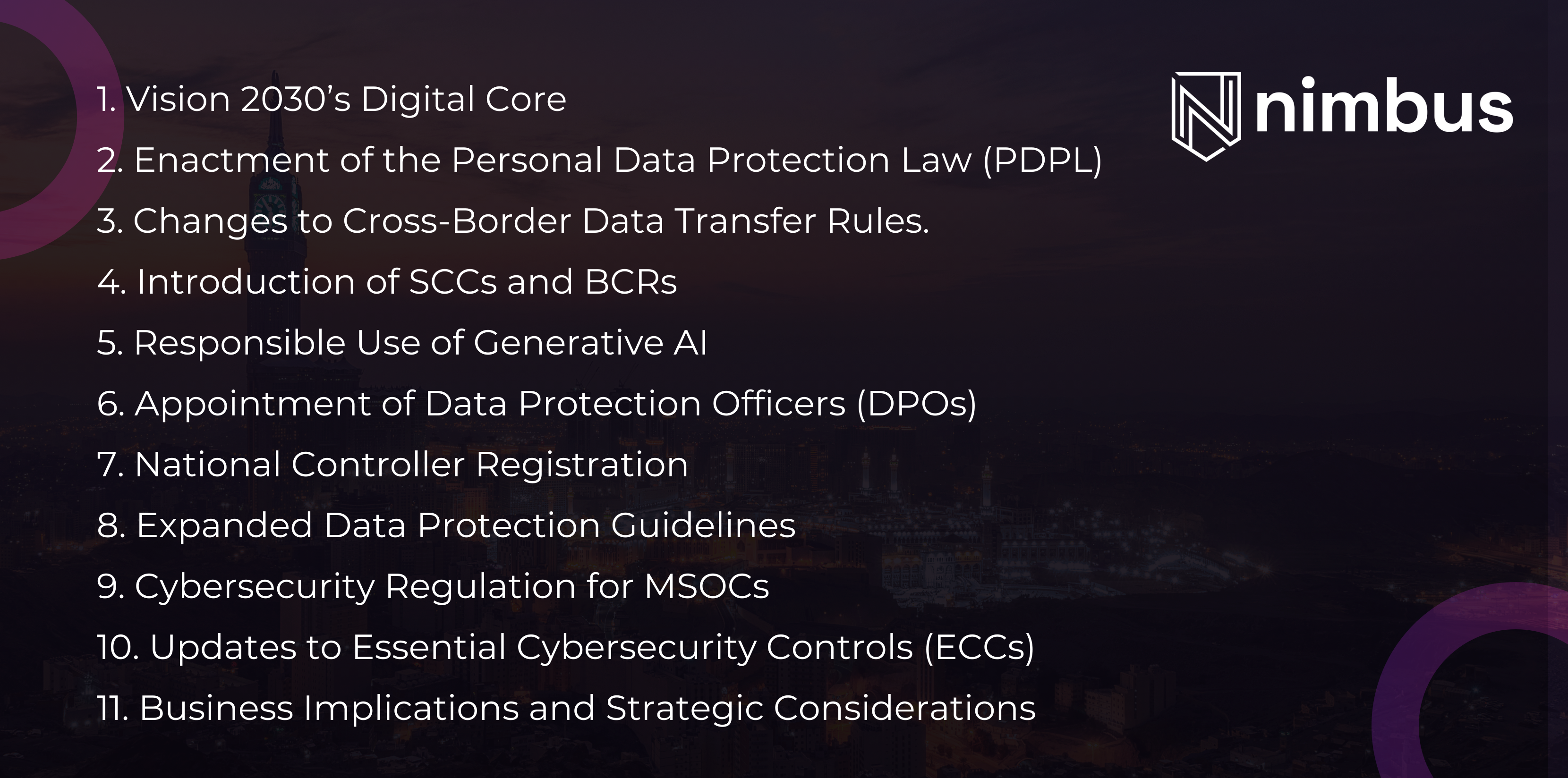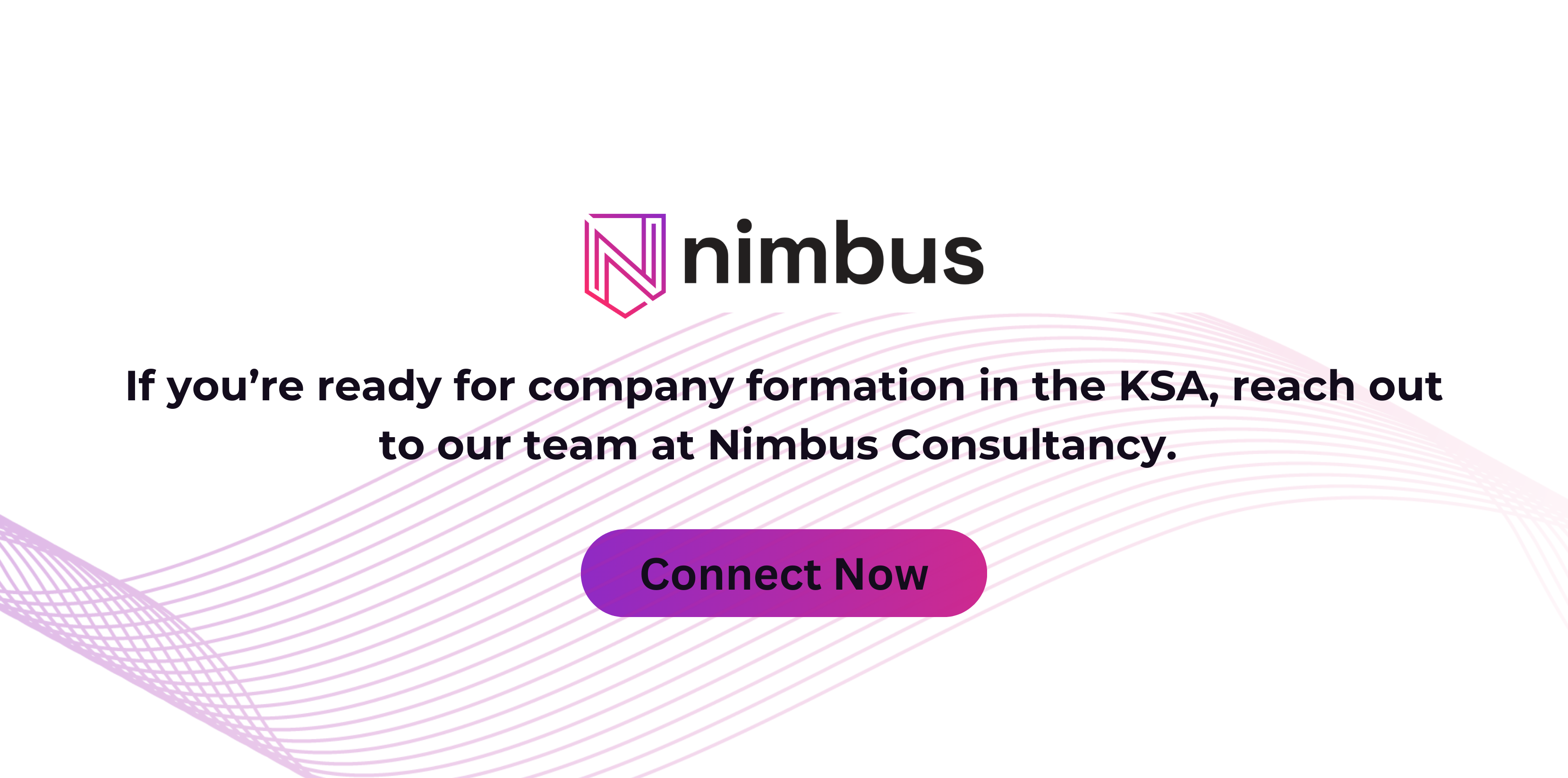Saudi Arabia is not just embracing digital transformation; it’s building an entire economy around it. Under its Vision 2030 program, regulation plays a crucial role in shaping a forward-thinking, data-driven future.
With most of the programs vividly tied to AI, businesses in the technology, AI, and digital services sectors are in the middle of a fast-evolving regulatory environment. Staying ahead of these changes is a compliance necessity and a strategic advantage as well.
This blog post lists Saudi Arabia’s most recent regulatory initiatives impacting the tech and data ecosystem, and what they mean for investors and innovators navigating this dynamic space.

1. Vision 2030’s Digital Core
Saudi Arabia’s technology transformation is a well-directed investment in data and artificial intelligence. The Saudi Data and Artificial Intelligence Authority (SDAIA) has been tasked with executing the national AI strategy and building the foundational infrastructure for a knowledge-based economy.
One of SDAIA’s iconic projects is the National Data Bank, serving as a centralized platform for aggregating, analyzing, and utilizing data across multiple sectors, including healthcare, education, finance, and smart city initiatives. This infrastructure is designed to lay the groundwork for sustainable innovation.
Additionally, the launch of Project Transcendence, a $100 billion initiative, demonstrates Saudi Arabia’s serious commitment to advancing AI adoption and high-tech innovation.
2. Enactment of the Personal Data Protection Law (PDPL)
In September 2024, the Personal Data Protection Law (PDPL) came into effect under the supervision of SDAIA. The PDPL applies to both local and international entities for processing the personal data of Saudi residents, regardless of where the data processor is located. Key obligations include:
- Gaining explicit consent for data collection and processing.
- Notifying individuals in case of data breaches.
- Adhering to data minimization and purpose limitation principles.
Non-compliance can lead to heavy penalties, making it critical for businesses to review and update their data management practices to ensure legal alignment.
3. Changes to Cross-Border Data Transfer Rules
To support international trade while maintaining data privacy, Saudi Arabia amended its Data Transfer Regulations in September 2024. The updated rules are modeled after international frameworks like the EU’s GDPR, requiring businesses to adopt recognized safeguards for cross-border transfers. Acceptable mechanisms now include:
- Standard Contractual Clauses (SCCs) approved by SDAIA.
- Binding Common Rules (BCRs) for multinational companies.
- Accredited certification frameworks for data processors.
Organizations transferring data to countries not recognized by SDAIA for adequate protection must incorporate one or more of these measures into their compliance strategies.
4. Introduction of SCCs and BCRs
For efficient management of international data flows, SDAIA introduced pre-approved SCC templates and guidelines for implementing BCRs. These legal tools are for safeguarding personal data when shared between organizations across borders.
For companies with global operations or remote teams, incorporating SCCs and BCRs into internal governance frameworks is a must for data integrity and regulatory compliance.
5. Responsible Use of Generative AI
The rapid adoption of generative AI models for content creation, software development, and other tasks has prompted SDAIA to issue guidelines for responsible AI use. These guidelines apply specifically to government agencies and public-facing services and emphasize:
- Ethical principles, including transparency and accountability.
- Risk mitigation strategies for potential misuse or bias.
- Requirements for human oversight and governance.
This regulatory focus on ethical AI pushes the private sector towards the responsible development and deployment of generative AI.
6. Appointment of Data Protection Officers (DPOs)
Under the PDPL, businesses that process sensitive personal data or engage in large-scale data processing activities must now appoint a Data Protection Officer (DPO).
The DPO is responsible for overseeing compliance efforts, managing data governance programs, and serving as a point of contact with SDAIA. This is a clear push toward embedding data protection into corporate governance.
7. National Controller Registration
Entities processing high-risk or sensitive data must now register with SDAIA. This mandate applies to:
- Public sector organizations.
- Private businesses handling sensitive data types.
- Companies with data processing as a core business activity.
Registration ensures that SDAIA can maintain oversight over high-impact data handlers and enforce stricter safeguards as necessary. Businesses in healthcare, fintech, cloud services, and digital identity should consider this a top priority.
8. Expanded Data Protection Guidelines
To support regulatory implementation, SDAIA has issued detailed guidance across several operational areas, including:
- Crafting compliant privacy policies.
- Applying data minimization and anonymization techniques.
- Establishing proper data retention and destruction protocols.
- Maintaining audit trails and records of processing activities.
These practical frameworks help companies not only comply with the law but also improve their overall data governance maturity.
9. Cybersecurity Regulation for MSOCs
The National Cybersecurity Authority (NCA) has rolled out a new licensing framework for Managed Security Operations Centers (MSOCs). This framework includes:
- Tiered licensing structures based on service capabilities.
- Mandatory certification for cybersecurity analysts.
- Ongoing compliance audits and risk assessments.
The regulation aims to elevate Saudi Arabia’s cybersecurity capabilities and ensure that threat detection and response services meet international standards.
10. Updates to Essential Cybersecurity Controls (ECCs)
The NCA has also amended its Essential Cybersecurity Controls (ECCs), introducing new elements like:
- Saudization targets to promote local talent in cybersecurity roles.
- Expanded rules for data localization, requiring certain data types to be stored and processed within Saudi Arabia.
- Clearer expectations for security governance and internal control mechanisms.
Organizations must revisit their security policies and cloud infrastructure plans to align with these updated ECC requirements.
11. Business Implications and Strategic Considerations
These regulatory changes create a new environment for business setup in Saudi Arabia. Here are some strategic considerations.
– Prioritize compliance: Proactively align your operations with SDAIA and NCA regulations. Waiting until enforcement increases could expose your business to penalties and reputational risks.
– Revisit cross-border strategies: Assess your data flow practices and integrate SCCs or BCRs where needed to continue international operations smoothly.
– Invest in governance and infrastructure: Strengthen your internal data protection, cybersecurity, and AI governance frameworks to meet evolving expectations.
All in all, the evolving technology and data framework of the KSA reflects its commitment to digital maturity and global competitiveness.
Staying agile, informed, and proactive is now essential for success in the Kingdom’s digital future.



